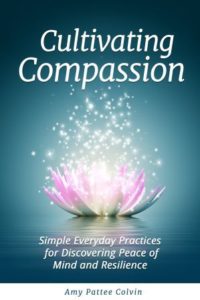We often hear the words compassion, self-compassion, and compassion for others. But what does it mean, and how do we implement it?
Compassion is a skill or an attribute that is like a muscle. It can be strengthened when you intentionally work with it, or it can weaken and become ineffective.
In other words, the choice is yours; you can choose to extend compassion to yourself and compassion for others, or you can choose to avoid it.
Sometimes, it is challenging to extend compassion to people who think, believe, or act differently than we do. However, benefits arise from extending compassion to all people, whether we like them or not.
Definition of Compassion
I’ve studied and practiced a form of Taoist meditation for nearly thirty years.
One of the primary pillars of this meditation practice is compassion—the other two pillars of Taoist meditation are humility and moderation.
I’ve also participated in the teacher training program for Stanford University’s Compassion Cultivation Training, an eight-week program designed to specifically help people deepen their self compassion and compassion for others.
Compassion is a mental and emotional state that includes three components:
- Awareness—acknowledging distress or suffering in yourself or others
- Empathy—being emotionally moved by this distress
- Action—enacting a response, which may involve physical activity like volunteering at a shelter, or it could be subtle such as mentally/intentionally sending someone well-wishes
Undoubtedly, sometimes it isn’t easy to extend compassion. Sometimes it takes work, and on the surface, may not feel good. But in the long run, your level of inner peace will increase when you lean toward compassion.
What is Schadenfreude and How Does it Relate to Compassion
Schadenfreude is taking some form of pleasure in someone else’s distress or suffering. One could say it is the opposite of compassion.
You’re aware of someone’s suffering, and the emotions that arise within you take the tone of, “Well, he deserved that; I hope he suffers a long time.”
With schadenfreude, one takes pleasure in seeing the suffering of another, and the action we sometimes take is to wish them continued harm.
But consider what embracing that mental and emotional state does to your own peace of mind. If you can, recall a time when you may have taken a tiny bit—or more—of pleasure in someone else’s pain. When you do, is your heart open? Does it warmly embrace all others? Or does it close you down just a little bit, perhaps even increase your anxiety or anger.
Schadenfreude gives us a perfect opportunity to practice using that mental and emotional muscle of compassion.
Compassion for Others Start With Self Compassion
To have compassion for others, you must start with compassion for yourself. Is that an easy path to follow? Not always.
Interestingly when research was conducted on the curriculum for Cultivating Compassion Training, instructors found that their test subject—Stanford students—were resistant to extending compassion to themselves, finding extending compassion to loved ones to be easier.
In turn, the eight-week program starts with a module on extending compassion to loved ones first.
As a long-time practitioner and teacher of compassion meditation, I understand the value of wading into compassion slowly. However, I find that building a strong foundation of self-compassion is essential, and thus, in programs I’ve developed, I choose to teach self-compassion first.
Bring to mind someone you find to be difficult. Notice I didn’t suggest that you bring to mind a difficult person.
Do you see the subtle difference language makes? In the second case, bringing to mind “a difficult person” embraces the mindset that the person is indeed difficult.
However, if you flip it and bring to mind “a person you find to be difficult,” suddenly it is your perception of the person that defines him or her.
The person is not inherently difficult, but you perceive it to be so. Noticing language use can be the first step toward deepening self compassion or compassion for others.
Also, an important step in developing self compassion is bringing awareness to how your thoughts make you feel physically and emotionally. When you are angry at someone, how does your body feel? Comfortable or tense? How do you feel emotionally? Joyful or distressed?
Given the opportunity, wouldn’t you rather be comfortable and joyful rather than tense and distressed? The choice is yours. If you choose to focus on and act on things that help you feel peaceful, at ease, less anxious, you’re practicing self compassion.
Also, learning to detach emotionally from situations that anger you is another form of self compassion.
Unskillful Behavior Arises From Unmet Needs
As we develop this compassion muscle, does that mean we need to agree with, like, or appreciate the actions of others? Absolutely not.
It is important to know your beliefs and to stand your ground. Compassion helps you do so from a place of emotional equanimity rather than from a place of self-righteous anger.
Let’s explore this notion that unskillful behavior comes from unmet needs—this idea is adapted from ideas presented by Marshall Rosenberg, the founder of The Center for Nonviolent Communication.
Consider a time in life when you’ve behaved unskillfully. In this case, unskillful is defined as actions that weren’t your best—perhaps you were mean, angry, grouchy, irresponsible, harmful, or anything else you can think of where you weren’t the most fun to be around.
Then consider what you needed at that moment that you weren’t getting. Needs can range from simple like a need for food to more complex like a need for affection, support, or space.
An example in my life happened while out cross country skiing. I was in my twenties and pretty new at skiing in the backcountry.
My friend and I were having a great time; hours flew by. Suddenly one of my bindings popped loose and came off the ski. I fell face first in the snow. I was mad and expressed it clearly.
For a moment, I was convinced I’d have to walk all the way out, and I became even grouchier. My friend skied over, took a look at my ski and binding, and said it was fixable.
I was still a royal grouch—a prime example of unskillful behavior—even though I’d just learned the problem was easily solved.
The next moment my friend asked me, “When was the last time you ate anything?” I replied that I hadn’t eaten since breakfast. He looked me straight in the eye and said, “You need to eat. Now. You’ll feel better about this afterward.” He was right. That was the first time in my life that I was aware of hangry, and now I know what to do when that happens again.
This is a pretty straightforward example of an unmet physical need, but I hope you can grasp the idea.
Now, bring to mind that person you find to be difficult. Consider the idea that he or she is behaving in an unskillful manner because of some unmet need. Maybe this person is in a job they don’t like or that beyond their skillset. Maybe this person is having a difficult time in a relationship with a loved one. Maybe this person is scared, or lonely, in pain.
For the most part, I like people. It is rare for me to have a deeply held dislike for anyone.
However, when I first started exploring this concept, I did have a person in my life that I found to be difficult—very difficult. When practicing compassion for people I found to be difficult, her face always appeared.
To make a long story short, she was someone in my work-life. She accused me of something I didn’t do and was on the verge of firing me.
Fortunately, through mediation, we realized that we were looking at a particular set of information from two divergent points of view. Eventually, we got onto the same page, and she apologized for the false accusation.
However, I still didn’t like her, which ultimately didn’t make me feel at peace as I tenaciously clung to anger over the events.
Over time, she moved into a different role. I later heard that she didn’t like her role when we knew each other or the responsibilities she held at the time of our conflict.
I realized that her problem wasn’t specifically with me; rather, she was unhappy in her role and felt uncomfortable with what she was asked to do. She was just doing her job—one that she didn’t like.
When I realized that I could release all my anger, and now when I think of her, I wish her well. I suspect both of us are more at peace now.
“Just Like Me” Recognizing Common Humanity is a Way to Extend Compassion for Others
Lastly, I want to quickly explore the value of recognizing common humanity as a way to help us extend compassion for others.
Even though you may not like someone else’s behavior, do your best to remember the other person needs to eat, drink, breathe, have shelter and clothing just like you do.
Just like you, that person is a child to someone and a friend to someone. Just like you, that person wants to love and be loved—even if they show it in ways that aren’t how you’d show it.
None of us are perfect, and yet we’re all human. When you begin to embrace this idea, it becomes easier to extend compassion to others, whether they’re our closest loved ones or the people we find to be most difficult.
Remember, compassion is like a muscle. Do your best to exercise it every day. Building that foundation of self-compassion is essential for helping you attain peace of mind, resilience, and joy. As you move more fully into this state of peace and joy, begin to lift your judgment of self and others and extend your compassion outward to all.
If you’d like to learn more about cultivating compassion for others, or you want to strengthen skills you already have, join me for an upcoming BodyMind IntelliSense or Compassion Cultivation Training program, or join me for an International Spiritual Tour where we’ll time daily practicing compassion meditation, qigong, and tools to create a positive mindset while exploring beautiful landscapes and fascinating cultures.
Lastly, If I can be of any help or answer any questions, or if you’d simply like to discuss what program is the best fit for you, contact me to schedule a time to chat.












